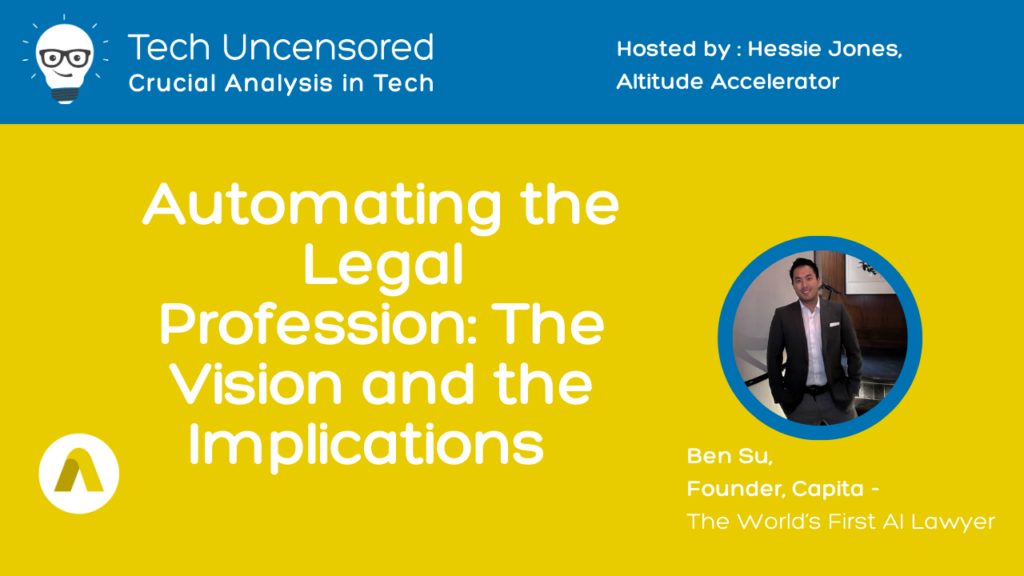Home » Automating the Legal Profession: Insights and Implications
Automating the Legal Profession: Insights and Implications

Summary of Discussion Between Ben Su and Hessie Jones on AI in the Legal Profession
Ben Su, a lawyer turned entrepreneur, shared the motivations behind venturing into artificial intelligence (AI) to disrupt the legal profession. His journey began during college, initially as a side hustle tutor. After co-founding a biotechnology startup and realizing the interdependence of law and entrepreneurship—where contracts govern commercial transactions—he pursued legal studies at the University of Ottawa. Su focused on understanding laws pertinent to technology startups, ultimately recognizing the potential of AI to automate complex legal decision-making.
After practicing law in Toronto, Su co-founded a venture called Capital, aiming to modernize the outdated legal system by improving access to legal services. His goal was to address the challenges faced by startups in financing and accessing affordable legal advice, particularly amid rising legal fees. Traditional legal practice often limits client communication due to hourly billing, creating anxiety that discourages consultations. In contrast, his approach emphasizes being a proactive thought partner to founders, rather than merely providing reactive legal services.
Su's team successfully launched a capital formation product that automated the fundraising process for startups, achieving significant traction and scaling quickly. They believe current legal services overlook clients’ desires for guidance in their entrepreneurship journeys; clients want more than document processing—they seek strategic insight. Su argues that existing AI implementations often merely optimize legal tasks rather than innovating how legal services are offered, creating a fragmented industry where costs keep rising without increasing value.
Despite the potential benefits of automation in legal services, Su acknowledges resistance from traditional lawyers, who fear job displacement. However, he contends that broader access to affordable legal services can increase the overall market size and foster entrepreneurial growth, benefiting society. Just as past technological advancements historically created new opportunities rather than reduced jobs, AI’s evolution in law is expected to generate unforeseen roles and enhance service delivery quality.
Su highlights the inefficiencies in how lawyers are compensated, particularly the disconnection between the billing practices and the value delivered. Many lawyers, especially juniors, are underpaid and overworked, often leading to diminished quality of service. He advocates for a reevaluation of pricing models in legal services to reflect the actual value provided, especially for startups lacking resources.
He envisions a future where legal education aligns with emerging technological realities, preparing graduates to leverage AI effectively. This shift could democratize access to legal resources, affording new entrants in the profession the ability to compete on a more equitable footing against established firms.
In conclusion, Su's venture represents a pivotal move towards transforming legal services through AI, promoting accessibility, affordability, and innovation. The ongoing discussion anticipates AI making significant contributions to the legal landscape, enhancing the partnerships between clients and legal professionals, ultimately fostering a more robust entrepreneurial ecosystem.
Altitude Accelerator
https://altitudeaccelerator.ca/
Altitude Accelerator is a not-for-profit innovation hub and business incubator for Brampton, Mississauga, Caledon, and other communities in Southern Ontario. Altitude Accelerators’ focus is to be a dynamic catalyst for tech companies. We help our companies grow faster and stronger. Our strength is our proven ability to foster growth for companies in Advanced Manufacturing, Internet of Things, Hardware & Software, Cleantech and Life Sciences. Our team consists of more than 100 expert advisors, industry, academic, government partners. The team helps companies in Advanced Manufacturing, Internet of Things, Hardware & Software, Cleantech and Life Sciences to commercialize their products and get them to market faster.


